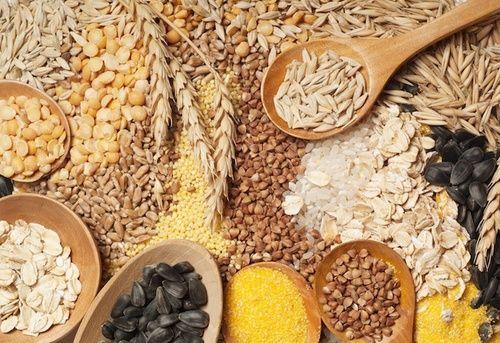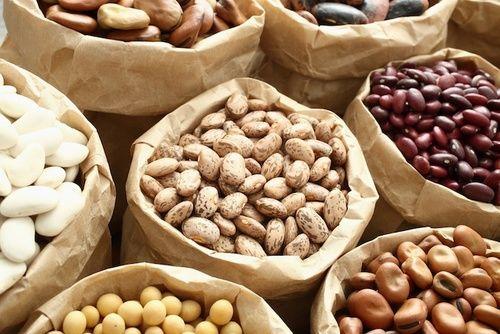Il magnesium it is a fundamental mineral for the organism. It plays an important role in the nervous system and for the musculature: it is in fact necessary to regulate the transmission of nerve impulses to the brain and for the contraction and relaxation of muscles, as it helps to maintain the electrical charge of cells, nerves and muscles. Let's find out how to integrate it naturally.
> Properties of magnesium supplements
> Phytotherapeutic supplements of magnesium
> Magnesium supplements on the market
> Daily requirement
Whole grains among magnesium food supplements

Properties of magnesium supplements
No other mineral seems to have such a large number of positive effectsi like magnesium. There are many properties of magnesium as a supplement. Which:
- The activity of magnesium on muscle contractions helps to relax the muscles of the respiratory tract, and this is very important in control of asthma.
- By regulating the contractions of the large coronary arteries, it seems decrease the risk of heart attack.
- It stimulates muscle and nerve function, normalizing the heart rhythm and promoting the regular transmission of nerve impulses.
- Magnesium is one alkaline substance, therefore, neutralizes the acid action of some foods, performing a calming action in cases of excessive stomach acid.
- Stimulates absorption of vitamins and mineral salts.
- It plays a central role in insulin secretion and action. The diabetes it is often associated with excessive loss of magnesium in the urine. Magnesium supplements would therefore help improve blood sugar.
- It is effective for counteract premenstrual syndrome. In fact, this mineral is able to significantly reduce pain and swelling.
- Magnesium supplements are also useful for treating annoying ailments related to menopause (hot flashes, night sweats, irritability and depression).
Magnesium, effects of deficiency and excess
Magnesium food supplements
Magnesium is present in many foods, but whole grains, all dried fruit, figs, milk, legumes are particularly rich in it.
It is contained in green leafy vegetables, being linked to chlorophyll, and in chocolate, especially dark chocolate, which is an excellent source of magnesium. Magnesium is present in foods such as seafood, crustaceans, freshwater and saltwater fish, snails and sunflower seeds.
The body works effectively in regulating the absorption of magnesium. In fact, if there is a low dietary intake of this mineral, the intestine absorbs a greater percentage of it from food, while the kidneys limit their losses; when the food intake is high, however, the excess magnesium is eliminated through the faeces.
The properties and benefits of legumes, rich source of magnesium

Phytotherapeutic supplements of magnesium
To make up for the magnesium deficiency the Phytotherapy offers natural products (available in the form of mother tincture or dry extract) based on medicinal herbs that contain generous quantities of this mineral, they are:
- Alfalfa (Medicago sativa): this medicinal plant is known for its restorative and remineralizing properties. The mother tincture is prepared from the leaves.
- Chondros (Chondrus crispus), also known as Irish moss, is a red alga that has remarkable remineralizing properties.
Magnesium supplements on the market
There are various types of magnesium-based supplements on the market. The main ones are those that include magnesium citrate and marine magnesium.
Il magnesium citrate is the magnesium supplement which also includes citric acid. This type of supplement is especially useful when playing sports to prevent the formation of lactic acid.
Il marine magnesium corresponds to magnesium chloride, an organic salt more easily assimilated.
It is useful to associate magnesium with vitamin B6, which favors the entry of magnesium into cells. These supplements come in different commercial forms: tablets and capsules, sachets of powdered magnesium and finally vials of liquid magnesium.
Daily requirement
Il daily requirement of magnesium for adult humans amounts to 300-500 mg and, given its distribution in numerous foods, it is apparently easy to satisfy. However, it must be considered that a significant amount of magnesium is lost due to the refining of cereals, the preservation and cooking of food.
It is also estimated that only 30-40% of the magnesium ingested with food is actually absorbed. Magnesium supplementation is required especially in the following cases:
- in diabetics.
- As a protection of the heart, in cases of arterial hypertension.
- For those who suffer from intestinal diseases, liver or kidney.
- After surgery.
- For those who use drugs such as oral contraceptives, diuretics and laxatives.
- In case of intense sporting activity.
READ MORE
Walnuts among magnesium food supplements: all the properties
Other articles on natural magnesium supplements:
> Magnesium among natural mineral supplements
> Magnesium deficiency? Here's how to integrate it
> Magnesium, melatonin and zinc: natural supplements against sleep disorders
> Supreme magnesium, what it is for and contraindications
> Supreme magnesium, posology
> Magnesium and potassium, benefits and contraindications
> Supreme Magnesium, supplement against fatigue
> Magnesium sulfate, the supplement to cleanse the liver
> Spring sickness: how to get out of hibernation syndrome
> Magnesium and potassium, how to take them
> Magnesium and bioavailability
> Magnesium in tablets or powder


























